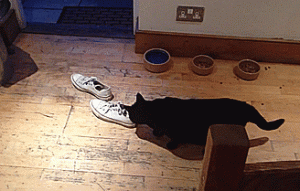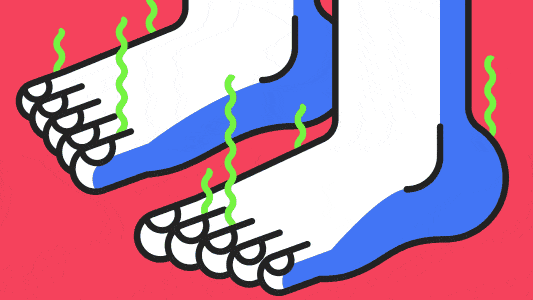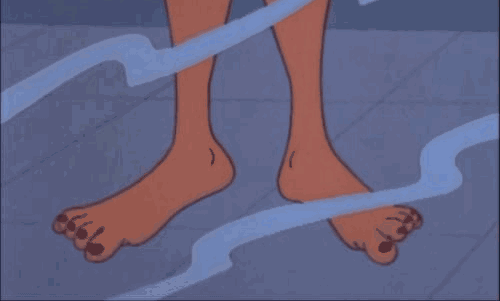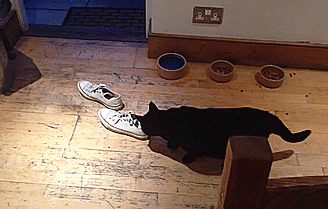
In the summer, except for the flesh on the body, there are pairs of feet with smell. High temperature and sweat seem to amplify the smell infinitely, making embarrassment nowhere to hide:
Visiting at a friend’s house, trying shoes at a counter, picnic or Japanese food shop
As long as you encounter the scene of taking off your shoes, you can’t wait to escape

Foot odor: a masterpiece of bacteria + foot sweat
On human feet, there are about 250,000 sweat glands, and there are an average of 600 sweat glands per square centimeter of skin, which is hundreds of times the number of sweat glands in the armpits. These sweat glands discharge at least about 200 mL of sweat per day on average.
Of course, the sweat here is not so “simple”. When your airtight shoes and socks prevent sweat from evaporating, bacteria will “bind” on the skin of your feet.
The sweat glands secrete salt, glucose, amino acids, etc., which provide nutrients to the bacteria on the feet. In return for these “free” nutrient supplies, bacteria produce mixed fatty acids, which cause odors.
In other words, sweat itself is odorless, and when foot sweat and bacteria come into contact with each other, some odorous substances gradually accumulate, and foot odor appears.
It’s feet obviously,
Why are some of them so strong?
Each pair of “scented” feet may be related to these 6 factors closely.
Well-developed sweat glands
Sweat glands are spread all over the body’s skin, mostly in the palms and bottoms of the feet, so the feet are one of the most sweaty parts of the human body.
Sweat itself is odorless, but some people have well-developed sweat glands, and a large amount of sweat is decomposed by bacteria attached to the skin surface and shoes and socks to produce odor.

The biggest suspected “bacteria” for foot odor: Staphylococcus
The feet are always covered
Men often wear leather shoes, women often wear airtight stockings and high heels, and wear warm boots every day in winter, all of which tend to make shoes or feet smelly.
Shoes don’t fit
If the size of the shoes is not appropriate, too small and sweating, too large will increase friction, increase foot dander, destroy the skin barrier, and make shoes a paradise for bacteria.
The shoes themselves have a “taste”
Poor quality footwear and socks can be smelled of heavy industrial dyes. In addition to foot odor, it may also cause skin allergies and other adverse reactions.

Poor living habits
A dark, damp area is the best breeding ground for bacteria. Footwear that is airtight, has little replacement, has not been cleaned and fully aired, is more likely to cause foot odor, and it is even worse in rainy and humid weather.
Many men sweat more and change shoes less frequently than women. Teenagers have a strong metabolism and exercise a lot. If they do not pay attention to washing their feet and changing shoes and socks in time after exercise, it is easy to cause foot odor.
Unhealed feet
The most common diseases that cause foot odor are fungal foot infections, which are commonly known as athlete’s foot and athlete’s foot.
The biggest difference between foot odor caused by tinea pedis and ordinary foot odor is whether there is skin damage.
Athlete’s foot lesions often occur between the toes, heels, plantars, lateral edges of the feet, etc., blisters, desquamation, etc., accompanied by itching, and even erosions and exudates in severe cases, and they are more likely to be complicated in later stages bacterial infections.
Do 3 things to deodorize the feet
There is no cure for foot odor. Generally speaking, if there is no special disease, washing your feet carefully every day and keeping your feet dry is the key to preventing foot odor effectively.

1. “Control” foot bacteria
People who are prone to foot odor should first wash their feet every day, especially after exercise.
Wash your feet for at least 15 minutes, and wash your toes well, and dry them in time after washing. Trim your toenails regularly and clean the gaps between the nails; exfoliate dead skin frequently to avoid humid environments and keratinous dander from becoming a breeding ground for nourishing bacteria. When the foot odor is severe, you can use antibacterial soap to clean it.
2. “Control” foot sweat
Change shoes and socks frequently, don’t wear a pair of shoes every day, and dry them thoroughly after washing .
Don’t wear shoes and socks that are of poor quality and do not fit your feet, and wear less airtight shoes such as synthetic leather shoes and boots, and socks with poor sweat absorption performance.
3. Timely “control” foot disease
Note: Foot odor, beriberi and beriberi are three different concepts completely.
To put it simply, foot odor is just odor, beriberi is foot odor + broken skin; as for beriberi, it is another name for vitamin B1 deficiency (not infectious).
Among them, athlete’s foot is contagious, and it may be contagious if it touches the skin directly or indirectly, such as sharing foot basins and towels.
Finally, Mr. Life wants to tell you a fact: due to the physiological structure of the feet, no matter how hygienic you are, you may inevitably emit a little smell. Doing a good job of daily cleaning and avoiding “sickness” of the feet is the best care for this part.
How would you remind people around who have stinky feet politely?

Comments